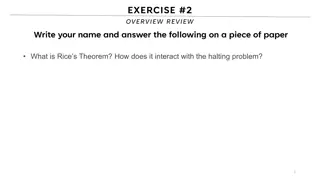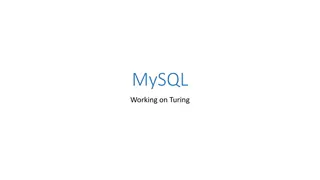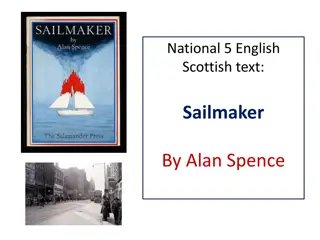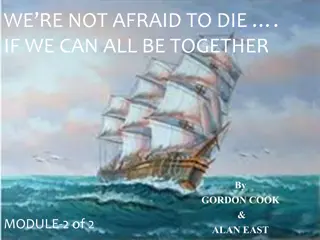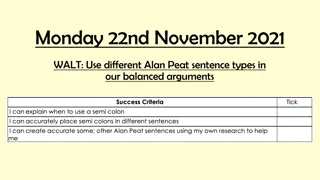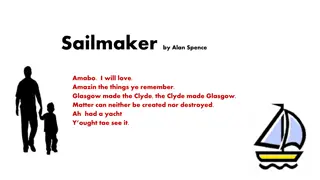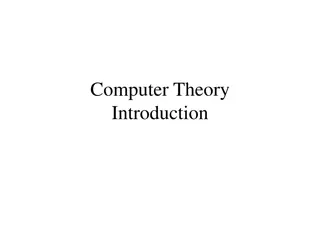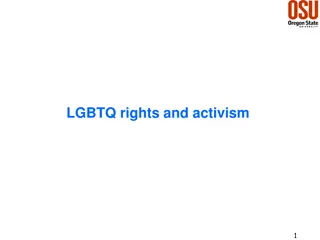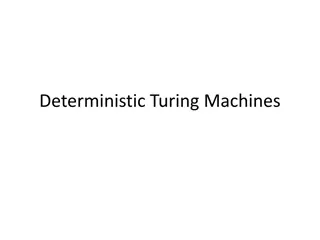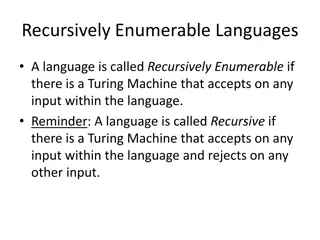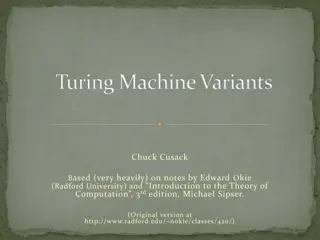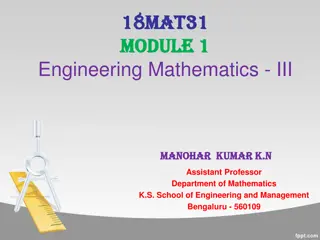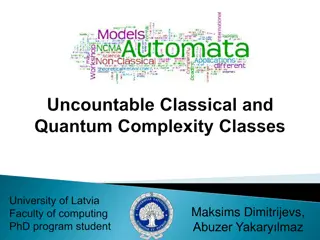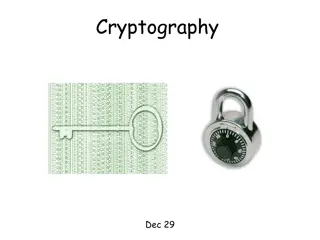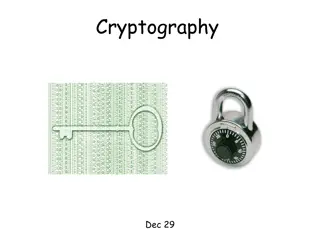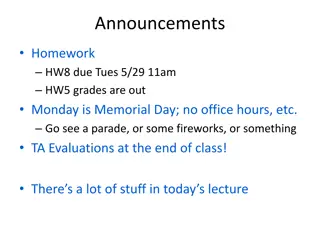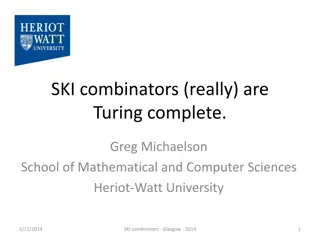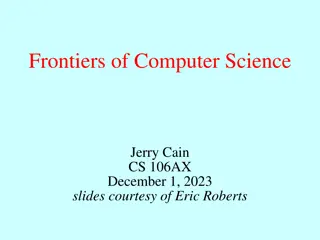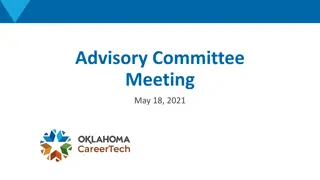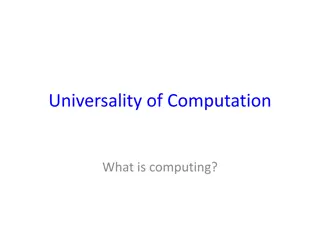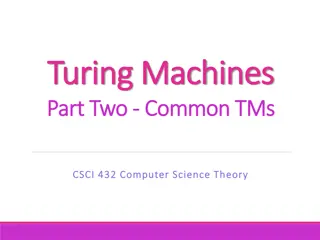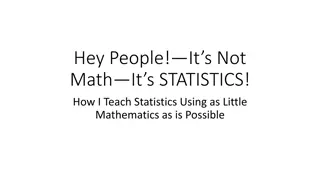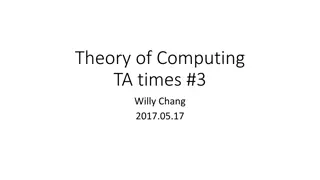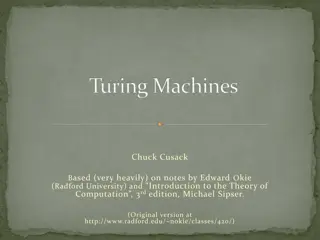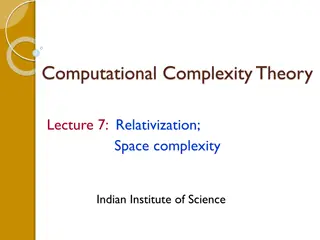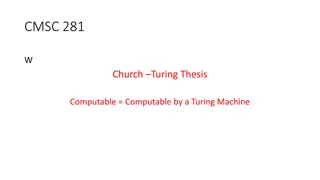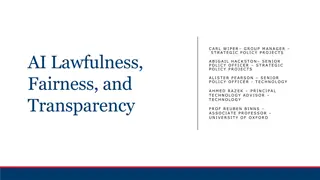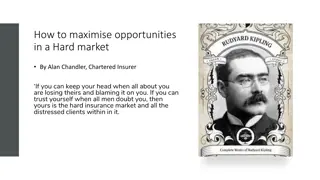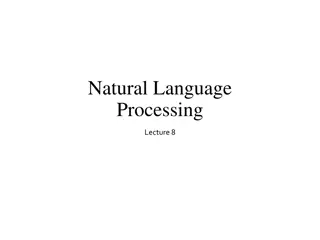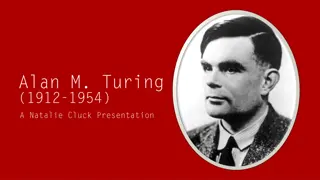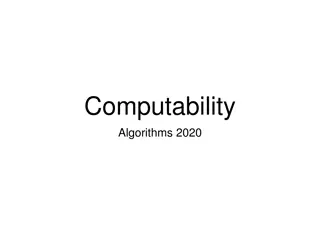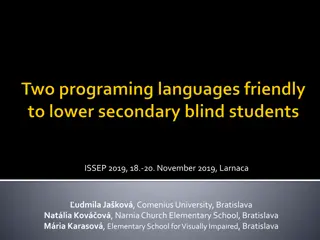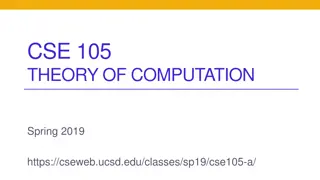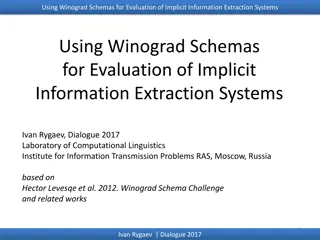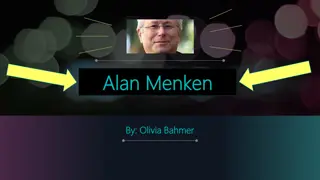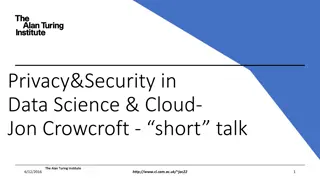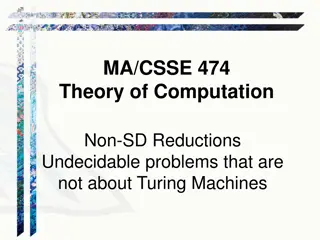Computability: Exploring Theoretical Limits of Computation
Delve into computability theory, focusing on what is computable and the limits of computation. Explore concepts like Rice's Theorem, the Halting Problem, and classes of expressiveness in computability theory, such as combinational logic, finite-state machines, pushdown automata, and Turing machines.
5 views • 43 slides
Guide to MySQL Operations on Turing Server
This guide provides step-by-step instructions on working with MySQL on Turing server at turing.csce.uark.edu. It includes logging in via SSH, connecting to the server, changing MySQL passwords, and performing operations on tables. Learn how to create tables, change passwords, and more with detailed
4 views • 21 slides
Evolution of Mathematical Theories and Proof Systems
Development of mathematical theories such as model theory, proof theory, set theory, recursion theory, and computational complexity is discussed, starting from historical perspectives with Dedekind and Peano to Godel's theorems, recursion theory's golden age in the 1930s, and advancements in proof t
2 views • 29 slides
Sailmaker" by Alan Spence: Themes and Characters
Dive into Alan Spence's "Sailmaker" where the story unfolds tragedy and relationships between characters like Alec and Davie. The play explores themes of grief, family dynamics, and the impact of loss. Through the characters' interactions, the author delves into the complexities of human emotions an
0 views • 41 slides
Survival Against the Odds: The Courageous Journey of Gordon Cook & Alan East
A gripping tale of survival at sea by Gordon Cook and Alan East, facing treacherous conditions after their ship, Wavewalker, is hit by a massive wave. Determined to reach safety, they battle the elements for hours, with moments of hope and despair. Their resilience is tested as they struggle to stay
0 views • 21 slides
Mastering Alan Peat's Balanced Arguments with Different Sentence Types
Explore the use of various Alan Peat sentence types in crafting balanced arguments, focusing on incorporating semi-colons effectively. Engage in interactive activities and practice sessions to enhance your skills in creating compelling arguments. Dive into examples and exercises to refine your under
2 views • 12 slides
Alan Spence: Exploring Glasgow Through Poetry and Plays
Alan Spence, a prolific author of poetry, novels, short stories, and plays, delves into the heart of Glasgow, drawing inspiration from his upbringing in the city. His major works such as "Sailmaker" reflect his personal experiences and the cultural divide in Glasgow, shaped by factors like the decli
1 views • 19 slides
Computer Theory: From Automata to Turing Machines
Dive into the world of computer theory, exploring concepts like automata, formal languages, and Turing machines. Learn about pioneers like Alan Turing and the fundamental questions in computer science, from computability to complexity.
3 views • 44 slides
LGBTQ Rights and Activism: A Historical Perspective
Alan Turing's contributions to computer science, his tragic experience as a homosexual in the 20th century, definitions of sexual orientation and gender identities, and the timeline of LGBTQ rights and setbacks in the US are discussed. The narrative highlights the struggles and progress made in advo
0 views • 16 slides
Insight into the Autobiographical Play "Sailmaker" by Alan Spence
Alan Spence's play "Sailmaker" delves into the poignant narrative of loss, familial struggles, and societal perceptions. Set in a staunchly Protestant culture of Glasgow, the play weaves a tale of Davie, a sail-maker, and his son Alec as they grapple with grief, adaptation, and personal transformati
1 views • 8 slides
Deterministic Turing Machines
Detailed explanation of Deterministic Turing Machines, their constituents, formal definition, determinism, and special statuses such as Start, Accept, Reject, and Loop. Includes visual representations and key concepts of deterministic Turing machines.
0 views • 14 slides
Recursive vs Recursively Enumerable Languages
Comparison between recursive and recursively enumerable languages in terms of Turing Machines acceptance, decidable languages, recognizable languages, and partial predicates. Explains the concepts with examples and how Turing Machines decide membership in languages.
0 views • 8 slides
Turing Machine Variants and Equivalence Theorems Summary
Explore different variants of Turing machines, such as stay-put TMs and multi-tape TMs, along with key results like the equivalence theorems. Understand the idea behind simulating multi-tape TMs with single-tape TMs and how different models are related. Dive into the proofs and implications of these
0 views • 14 slides
Engineering Mathematics and Automata Theory Concepts
Delve into topics such as automata theory, Turing machines, and mathematical approaches for addition using unary numbers. Discover state transition diagrams and gain insights into the workings of Turing machines in computer science.
0 views • 23 slides
Theoretical Studies on Recognizing Languages
Various models such as Deterministic Turing Machines, Probabilistic Models, and Quantum Classes are explored for recognizing languages, with discussions on regular, nonregular, and uncountable languages. Theoretical concepts like bounded-error recognition, computational complexities, and enumeration
0 views • 28 slides
Introduction to Cryptography: The Science of Secure Communication
Cryptography is the study of methods for sending and receiving secret messages securely. This lecture explores the application of number theory in computer science, focusing on the design of cryptosystems like public key cryptography and the RSA cryptosystem. The goal of cryptography is to ensure th
0 views • 53 slides
Introduction to Cryptography and Its Applications in Computer Science
Cryptography is the study of methods for sending and receiving secret messages. In this lecture, we explore the design and application of cryptosystems, such as the RSA cryptosystem and Turing's Code. The goal is to securely encrypt and decrypt messages using number theory to protect communication f
2 views • 53 slides
Sizes of Infinite Sets: Insights into Countably Infinite Concepts
Explore the fascinating world of countably infinite sets through informative images and explanations from a CSE 105 lecture on the Theory of Computability. Delve into the concepts of natural numbers, strings, Turing machines, languages, and the intriguing implications of the Pigeonhole Principle. Di
0 views • 26 slides
Combinators and Computability: Unveiling the Foundations
Delve into the realm of combinatorial logic and computability through the lens of SKI combinators, exploring their Turing completeness and connection to algorithmic decision-making. Discover the historical significance of Hilbert's program, Godel's incompleteness proofs, the Church-Turing thesis, la
0 views • 65 slides
Insights into "Sailmaker" by Alan Spence and His Glasgow Roots
Delve into the life and works of Alan Spence, an acclaimed author from Glasgow. Explore his major works like "Sailmaker" reflecting his childhood experiences, cultural divides in Glasgow, and themes of love and memory. Discover how his background shaped his literary creations and his journey as a wr
0 views • 19 slides
Intersection of Artificial Intelligence and Chess: A Historical Perspective
Delve into the captivating world of artificial intelligence and chess, tracing back to Alan Turing's groundbreaking thought experiment, the development of chess-playing computer programs, and the iconic match where IBM's Deep Blue defeated Garry Kasparov in 1997. Learn how these events shaped the la
0 views • 27 slides
Update on Advisory Committee Meeting and Accreditation Staff Members
The Advisory Committee Meeting held on May 18, 2021 discussed important matters with a diverse group of members, including Accreditation Staff led by Jessica Ventris. Dr. Justin Lockwood, Sandra McKnight, Alan Nahs, and Kim Downey played crucial roles. The committee members and staff covered various
0 views • 27 slides
Overview of Universality and Church-Turing Hypothesis
The universality of computation encompasses physical and mathematically defined computation, along with the concept of Turing machines and universal computers. The Church-Turing Hypothesis posits that everything computable can be computed by a Turing machine. The modern interpretation extends this t
0 views • 27 slides
Turing Machines and Busy Beaver Problem in Computer Science Theory
Delve into the realm of Turing machines, the Busy Beaver problem, palindromes, and incrementing algorithms. Explore the configurations of a Turing machine tape, the maximum number of 1s a machine can print and still halt, algorithms to determine palindromes, and tape setup for incrementing.
0 views • 10 slides
Teaching Statistics with Minimal Mathematics: A Practical Approach by Alan S. Chesen
Alan S. Chesen, a faculty member at Wright State University, provides insights on teaching statistics with minimal mathematics. He emphasizes the use of statistical software over complex math techniques, preparing students to interpret and apply statistical studies in real-world scenarios. By utiliz
0 views • 18 slides
Theory of Computing TA Times #3 - Willy Chang
Explore insights on proof by construction, PDA handling, unambiguous grammar, Turing machines, and more in this TA session. Learn how to provide steady examples for proofs, avoid ambiguous grammar structures, and understand the equivalence of Turing machines with reset options.
0 views • 13 slides
Overview of Turing Machines: Introduction, Tape, and Computation
Turing Machines are fundamental in the theory of computation, capable of recognizing all computable languages. They consist of a Finite State Machine combined with an infinite tape. The tape is initialized with input on the left end, and a TM's computation can either halt by entering special accept
0 views • 29 slides
Oracle Turing Machines in Computational Complexity Theory
The lecture delves into the concept of Oracle Turing Machines and their role in proving computational complexity results, such as the limitations of diagonalization in demonstrating P vs. NP. Oracle Turing Machines are defined as Turing Machines with access to a special query tape and states for ora
0 views • 59 slides
Church-Turing Thesis and Computability with Turing Machines
The Church-Turing Thesis states that every computable function can be computed by a Turing Machine. This concept, pioneered by Turing, revolutionized the way we understand computability and algorithms. By breaking down the process into primitive operations, we can express complex algorithms in an un
0 views • 21 slides
Lawful Bases in AI Data Processing
Explore the importance of identifying lawful bases when utilizing AI, considerations for statistical accuracy, addressing bias and discrimination risks, and ensuring transparency in AI processes. Discover guidance from the ICO and The Alan Turing Institute on explaining decisions made with AI, and l
0 views • 18 slides
Strategies for Success in a Hard Insurance Market by Alan Chandler
Learn how to thrive in a challenging insurance market from Alan Chandler, a seasoned Chartered Insurer. Discover key insights on navigating premium increases, coverage reductions, and limited options for brokers. Equip yourself with the knowledge to communicate effectively with clients and maximize
0 views • 29 slides
Advanced Smoothing Algorithms in Natural Language Processing
Dive into the world of advanced smoothing algorithms like Good-Turing, Kneser-Ney, and Witten-Bell used in Natural Language Processing. Explore concepts such as Good-Turing Smoothing Intuition, Unigram Prior Smoothing, and more general formulations for better language modeling through statistical te
0 views • 21 slides
Alan Turing: Mathematician, Cryptanalyst, and Computer Science Pioneer
Alan Turing, an English mathematician, cryptanalyst, logician, philosopher, and pioneer in computer science, played a crucial role in deciphering German Enigma encrypted messages during World War II. He is known for his work on the Turing machine, considered the foundation of theoretical computer sc
0 views • 6 slides
Hilbert's Program and Turing Machines in Mathematics
Delve into Hilbert's Program and its impact on the understanding of mathematical truth, from attempts to resolve paradoxes to the concept of formalization of effective procedures. Understand the significance of Godel's incompleteness result in the context of algorithmic decision-making. Explore the
0 views • 40 slides
Enhancing Programming Skills for Blind Students with Alan and Torino Environments
In this research study, blind students' misconceptions in solving tasks with command sequences and loops are observed. The study explores the use of Alan and Torino programming environments for blind students. The research aims to understand the advantages and disadvantages of programming in these e
0 views • 16 slides
Theory of Computation: Undecidability and Counting Arguments
Dive into the world of theory of computation with a focus on undecidability, counting arguments, and examples of non-Turing recognizable languages. Discover the intricacies of proving problems as undecidable and delve into the concepts of Turing-recognizable sets and deciders for complex computation
0 views • 22 slides
Evaluation of Implicit Information Extraction Using Winograd Schemas
Winograd Schemas are utilized for evaluating implicit information extraction systems. Ivan Rygaev discusses the challenges and significance of this method compared to the Turing Test, emphasizing the need for world knowledge for successful interpretation. The schemas propose unique anaphora resoluti
0 views • 18 slides
The Musical Journey of Alan Menken - A Legacy in Songwriting
Alan Menken, a musical genius, began his journey to success with a rock ballet and gained fame with "Little Shop of Horrors." He continued to create iconic musicals like "The Little Mermaid," "Beauty and the Beast," and "Aladdin," winning numerous awards along the way. His contribution to the world
0 views • 6 slides
Insights on Privacy and Security in Data Science and Cloud Computing
Explore key insights from Jon Crowcroft's talk at The Alan Turing Institute on privacy, security, data science, and cloud. Learn about layering, high throughput, low latency in data centers, decentralized IoT, community mesh networks, and the implications for privacy in data analysis. Discover how t
0 views • 15 slides
Undecidable Problems in Theory of Computation
Explore the concept of undecidable problems in the theory of computation, focusing on non-SD reductions and undecidable problems not involving Turing Machines. Learn about proving languages are not SD, using examples like AanBn and creating reductions to show non-SD properties. Work through reductio
0 views • 31 slides
